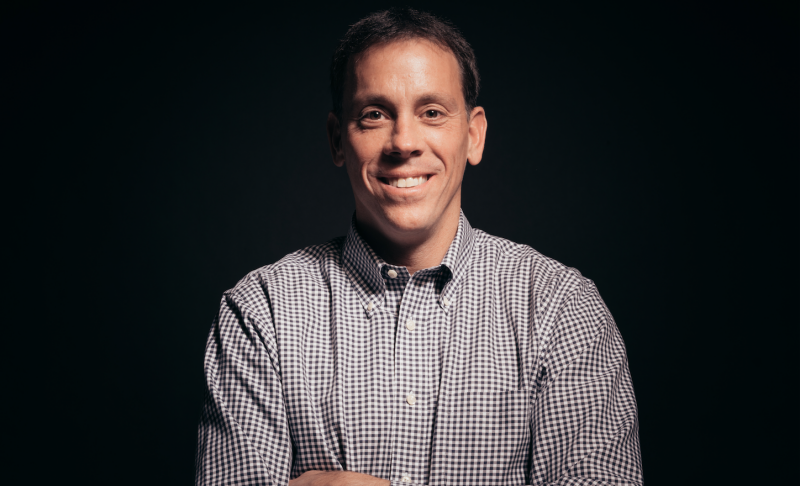
Over nearly six years, Axios has demonstrated that start-ups grounded in quality journalism can make serious money in the digital world. Started from scratch in January 2017, Washington, DC-headquartered Axios sold to Cox Enterprises for $525m this summer.
For chief executive Jim VandeHei, who co-founded the business with journalist Mike Allen and president Roy Schwartz, it’s just the beginning.
“Axios is probably 1-2% as big as I think it can be,” he tells Press Gazette’s Future of Media Explained podcast. “That’s how enormous I think this can be.
“If we execute – that’s a lot of ifs, there’s a lot of things that we have to get right – but there’s no reason that a couple of years from now, we’re not thousands of employees, with tentacles deep into every community in America, and we’re starting to expand internationally.”
‘Starting a profitable media company is very difficult’
Before Axios, VandeHei, a former Washington Post political journalist, was a founder of Politico, which itself was bought by Axel Springer for $1bn in the summer of 2021.
VandeHei believes there have not been enough success stories in the digital news media sector. But he’s hopeful that a new crop of entrepreneurs – perhaps inspired by Politico and Axios – can succeed.
“Starting a profitable media company is very difficult,” says VandeHei. “If you look at the history of the internet, at least in America, you can count on one hand really the number of successful media companies that have sold and have really been able to derive real value from it.
“You had obviously Insider, Business Insider at the time [which sold to Axel Springer for around $450m in 2015]. The Athletic sold to The New York Times [for $550m in January 2022]. Politico sold to Axel Springer. And now we sold to Cox. Vox has been successful, but there’s not that many successful media companies.”
Where other businesses have struggled, says VandeHei, is in finding a balance between building a good business and a good editorial proposition. “To have a really successful media company you have to have as good of a business as you do an editorial product,” he says. “And when you think about editorial products, you have to think about the business. Those two have to work in synchronicity.
“I think so many of the media companies of the digital era that failed did one well and the other poorly. And so they might have had a really interesting editorial product, but they didn’t think about the business.”
We have ‘opened the door’ for journalist-entrepreneurs
VandeHei believes it is rare to find journalists with appropriate entrepreneurial skills, but he believes this might be changing. “There haven’t been that many journalists who successfully started media companies,” he says. “You’re seeing more of it. I think it’s one of the most promising trends.
“If you look in the US, if you look at Puck, if you look at Punchbowl, if you look at Semafor, which is about to launch, if you look at Jessica Lessin at The Information – those are all journalists turned entrepreneurs. So I love that trend.
“I think the advantage that I personally found, being a journalist who then became an entrepreneur who became a CEO, is just the ability to be able to sniff out what’s real and not real – the ability to pick up the phone or to the research to figure out how do you actually fully understand and master a given area.”
Asked if he sees these startups as offspring of Politico and Axios, VandeHei says: “I do. In a good way. I think Jessica Lessin has been very clear that she mimicked a lot of the work that we did at Politico to create The Information, and she’s created an amazing company and she should be very proud of what she’s built.
“If you look at the group that started Puck, we’ve talked a lot with them, I think they drew a lot of inspiration for how they run a company and how they think about content from us.
“Punchbowl – Jake Sherman, Anna Palmer, John Bresnahan – they all worked for us [at Politico]. We’ve been helpful in trying to help them think about how to do their company. And they’ve been extremely successful.
“Ben Smith, who’s part of the team that going to do Semafor, worked for [Politico], he’s a friend of ours. So, yeah, I would like to think that we have had an effect on how people think about running these companies.
“But more importantly, hopefully the effect that we had – and I think it goes back to the work [Politico co-founder] John Harris and I did early on – is I think we opened the door to the possibility that journalists can be entrepreneurs.”

The smart brevity book
Axios has firmly established itself as a major player in the US national news market across several sectors, including politics and business. At the core of its success, believes VandeHei and his team, is the concept of “smart brevity”.
In January 2017, Axios launched with “smart brevity” as a slogan, setting itself the goal of delivering “the clearest, smartest, most efficient and trustworthy experience for audience and advertisers alike”.
The Axios founders used the concept to create a specific form of article – using bolded font and bullet points – that is used by all of its journalists.
Now VandeHei, Allen and Schwartz have written a book about it, Smart Brevity: The power of saying more with less. VandeHei believes the book can be used by journalists, communicators and businesspeople to help them sharpen their message.
“Smart brevity is a sort of way of rethinking how you communicate,” he says. “It’s based totally on the data and the science and the trends about where the human mind is going. It teaches you how to be much more effective, much more efficient, both in writing and verbal communications. It shows the power of using short words, sharp words, smart words – getting rid of acronyms and the business speak.”
‘I’m never starting another media company’
What next for VandeHei? Often when an entrepreneur sells their business, they step down from day-to-day duties. VandeHei has stayed on as chief executive of Axios.
“This is all I want to do,” he says. “I don’t have any other tricks in the bag. I start and I run media companies, and I love it, and I would do it for free, and I want to do it with Axios.
“And I think Axios has all the ingredients that I want. There’s no other media company that I would ever want to run, and I’m never starting another media company.”
Top photo: The Axios newsroom (credit, Aha Concepts)
Email pged@pressgazette.co.uk to point out mistakes, provide story tips or send in a letter for publication on our "Letters Page" blog
